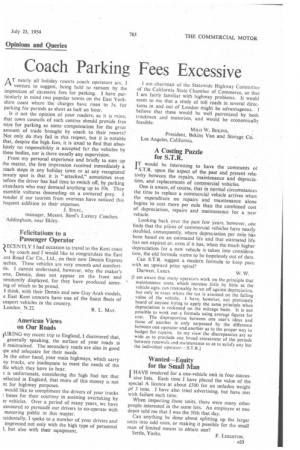Coach Parking Fees Excessive
Page 57

If you've noticed an error in this article please click here to report it so we can fix it.
A T nearly all holiday resorts coach operators are, 1 J—k venture to suggest, being held to ransom by the imposition of 'excessive fees for parking. I have particularly in mind two popular towns on the East Yorkshire coast where the charges have risen • to 5s. for parking for periods as short as half an hour. _ Is it not the opinion of your readers, as it is mine, that town councils of such centres should provide free sites for parking as some compensation .for the great amount of trade brought by coach to their resorts? Not only do they fail in this respect, but it is notable that, despite the high fees, it is usual to find that absolutely no responsibility is accepted fcr the vehicles by these bodies, nor is there usually any supervision. From my personal experience and briefly to sum up the matter, the first impression received immediately a :oach stops in any holiday town or at any recognized beauty spot is that it is "attacked," _sometimes even 3efore the driver has had time to switch off, by parking atendants who may demand anything up to 10s. They esemble .vultures 'descending on a cornered prey. I yonder if our tourists from overseas have noticed this teqnent addition to their expenses. . J. STEEL, •
manager, Messrs. Steel's Luxury Coaches. Addinghain, near Ilkley.
Felicitations to a Passenger Operator
?ECENTLY I had occasion to travel to the Kent coast by coach and I would like to congratulate the East :ent Road Car Co., Ltd., on their new Dennis Express >aches. These vehicles are very smooth and comfort>le. I cannot understand, however, why the maker's tine, Dennis, does not appear on the front and 'ominently displayed, for they have produced someing of which to be proud. I think, with their Dennis and new Guy Arab models. e East Kent concern have one of the finest fleets of insport vehicles in the country.
London. N.22. R. L. MAY.
American Views on Our Roads
,URING my recent trip to England, I discovered that, generally speaking, the surface of your roads is ll maintained. The secondary roads are also in good tpe and adequate for their needs. 3n the other hand, your main highways, which carry fly trucks, are inadequate to meet the needs of the ffic which they have to bear.
t is unfortunate, considering the high fuel tax that :ollected in England, that more of this money is not nt for highway purposes. would like to compliment the drivers of your trucks t buses for their courtesy in assisting overtaking by er vehicles. Over a period of many years, we have eavoured to persuade our drivers to co-operate with motoring public in this master.
widentally, I spoke to a number of your drivers and impressed mit only with the high type of personnel I, but also with their equipment. I am chairman of the Statewide Highway Committee of the California State Chamber of Commerce, so that I am fairly familiar with highway problems. It would seem to me that a study of toll roads in several directions in and out of London might be advantageous. I believe that these would be well patronized by both truckmen and motorists, and would be economically feasible.
MILO W. BEKINS,
• President, Bekins Van and Storage Co. Los Angeles, California.
A Costing Puzzle for S.T.R.
IT would be interesting to have the comments of S.T.R. upon the aspect of the past and kesent relativity between the repairs, maintenance and depreciation, and replacements of commercial vehicles. One is aware,. of course, that in normal circumstance', the time to replace a commercial vehicle arrives when . the 'expenditure on repairs, and maintenance alone begins to cost more per mile than the combined cost of 'depreciation, repairs andmaintenance for a new vehicle.
Looking back over the past few years. however, one finds that the prices of commercial vehicles have nearly . doubled, consequently, where depreciation per mile his been based on an estimated life and that estimated life has not expired or, even if it has, when the much higher 'depreciation for a new vehicle is taken into consideration, the old formula seems to be hopelessly out of date. Can S.T.R. suggest a modern formula to keep pace with an upward price spiral? Darwen, Lancs. W. W.
[1 am aware that many operators work on the principle that %. maintenance costs, which increase little by little as the vehicle ages. can reasonably be set off against depreciation, but only in cases where the tax is assessed on the falling value of the vehicle. I have, however, not previously heard of anyone trying to apply the same principle when depreciation is reckoned on the mileage basis. It is not possible to work out a formula using average figures for cost. The disproportion between one user's ideas and those of another is only surpassed by the difference between one operator and another as to the proper way to budget for repairs. In my -view the discrepancies are so wide as to preclude any broad assessment of the periods between renewals and maintenance so as to satisfy any but the individual operator.—S.T.R.]
Wanted—Equity for the Small Man
I HAVE tendered for a one-vehicle unit in four succes
sive lists. Each time I have placed the value of the special A licence at about £500 for an unladen weight pf 3 tons. I have also tried advertising, but have met with failure each time.
When inspecting these units, there were many other people interested in the same lots. An employee at one depot told me that I was the 50th that day. Can anything be done about splitting up the larger units into odd ones, or making it possible for the small man of limited means to obtain one?
Settle, Yorks. F. LEIGHTON.




























































































